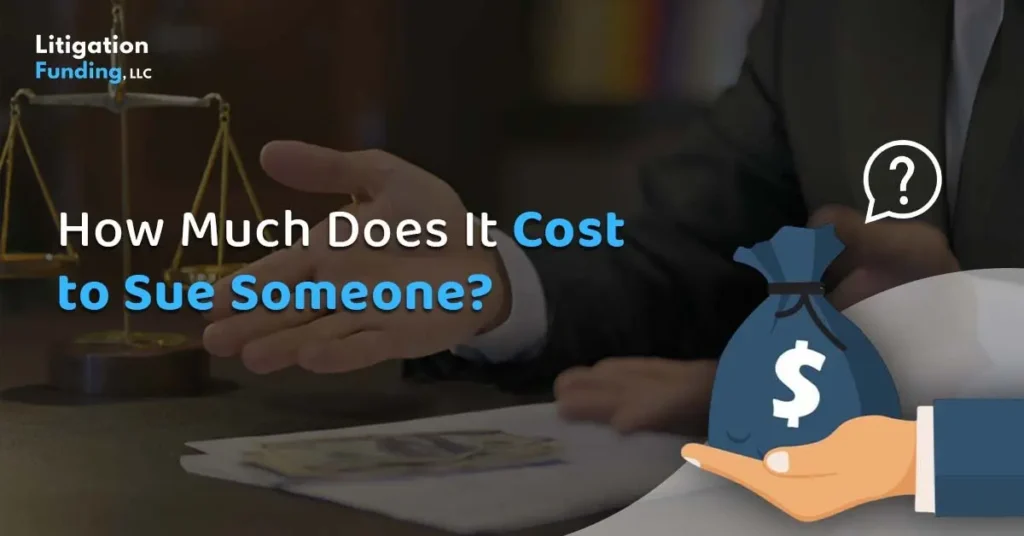Deciding to sue someone is never just an emotional or legal choice it is also a financial one. The cost of a lawsuit can range from a few hundred dollars in small claims court to more than $70,000 in complex civil litigation. Personal injury cases often fall between $5,000 and $50,000, depending on the severity of injuries and damages involved.
These expenses can feel overwhelming, especially when medical bills and lost wages are already piling up. That is where pre-settlement funding becomes a lifeline. For Michigan plaintiffs, it provides immediate financial relief while waiting for a case to settle without adding debt or repayment obligations unless you win.
The Average Cost of a Lawsuit
The total cost of suing someone depends on the type of lawsuit, case complexity, attorney fees, and trial length.
| Type of Case | Estimated Cost |
| Small Claims Lawsuit | $1,000 – $5,000 |
| Personal Injury Case | $5,000 – $50,000 |
| Civil Lawsuit (general range) | $15,000 – $70,000+ |
| Trial Costs & Appeals | $10,000 – $100,000+ |
Source: Pusch & Nguyen Law Firm
Factors That Influence Civil Lawsuit Costs
The price tag of a lawsuit is not carved in stone. It bends and shifts depending on a number of moving parts. To understand why some people spend only a few hundred dollars while others sink tens of thousands, it helps to look closely at the elements that drive the bill.
Type of Lawsuit
A case’s nature plays a decisive role. Filing in small claims court may cost a little more than paperwork and a filing fee. In contrast, a personal injury lawsuit can balloon quickly, pulling in medical specialists, accident reconstructionists, or lengthy hearings. Business disputes often grow even heavier, requiring accountants, contract analysts, and niche experts whose fees pile on fast.
Case Complexity
Simple cases are rare. When there are multiple parties, mountains of evidence, or contested liability, expenses swell. Complex lawsuits demand more hours, more documentation, and often more courtroom battles, which inevitably ratchet up the cost.
Attorney Fees
The lawyer’s bill is usually the heaviest line item. Some attorneys charge by the hour, others work on contingency, taking a slice of any settlement, and some quote flat rates. Each structure carries its own risks and rewards. The wrong choice can make legal fees feel like a second opponent in your case.
Court and Filing Fees
Courts charge for nearly every step. Complaints, motions, appeals, all of them carry a price tag. These sums may appear small at first glance, but across months of litigation, they accumulate, chipping away at your finances.
Discovery Process
Discovery is often the costliest stage outside of trial itself. Depositions, document subpoenas, forensic testing, and expert testimony can drain thousands before a jury ever hears a word. The deeper the evidence runs, the deeper the plaintiff’s pockets must be.
Trial and Appeals
When a lawsuit stretches into trial or, worse, into appeals, expenses surge. Trial prep requires exhibits, technology, witness travel, and attorney hours on overdrive. If the verdict is challenged on appeal, expect another round of legal fees and procedural costs that can reach five figures on their own.
Taken together, these forces explain why one person’s lawsuit feels like a small bill while another’s spirals into a financial marathon. To make the numbers more concrete, let’s break down the common categories of litigation costs in the next section.
Breakdown of Common Litigation Costs
Even when two cases look similar on the surface, the bills rarely do. The money trail of a lawsuit splinters into many categories, some predictable, others less obvious until they hit your wallet. Below is a look at the most common expenses plaintiffs face when bringing a case to court.
| Expense Category | Typical Range | What It Means in Practice |
| Court Filing Fees | $100 – $500+ | The basic price of getting your complaint into the system. Every motion, appeal, or petition adds more. |
| Service of Process | $50 – $200+ | Paying a process server or sheriff to deliver legal documents to the defendant. |
| Attorney Hourly Rates | $100 – $500+ (avg. $300/hour) | The largest cost for most plaintiffs; fees climb rapidly in complex cases. |
| Expert Witness Fees | $200 – $1,000+ per hour | Doctors, engineers, or specialists whose testimony strengthens your argument. |
| Discovery & Depositions | $1,000 – $10,000+ | Costs tied to gathering and exchanging evidence, including sworn statements. |
| Trial Preparation & Exhibits | $5,000 – $25,000+ | Building the case for court—charts, visuals, travel expenses, and endless prep hours. |
| Appeal Costs | $10,000 – $30,000+ | If the verdict is challenged, another expensive legal battle begins. |
What this table shows is that lawsuits rarely drain money in one lump sum. Instead, the cost leaks out in steady streams from the first filing fee to the last appeal. Plaintiffs often underestimate how quickly small charges snowball into major financial strain. This is where pre-settlement funding can make a difference, offering breathing room while the case winds through the courts.
Who Pays for a Lawsuit?
Lawsuits do not come with a single bill, and the responsibility for paying those expenses usually falls on each side. In most civil cases, both plaintiff and defendant are expected to cover their own attorney fees, filing charges, and expert costs.
- Certain statutes allow the prevailing party to recover attorney fees from the other side, but these situations are uncommon.
- More often, attorney fees are deducted directly from the settlement or judgment amount before the plaintiff receives their share.
- In limited situations, it may be possible to countersue for legal fees, but success is rare and not something to count on.
Because of this uncertainty, plaintiffs must plan for how they will sustain themselves while litigation unfolds.
How to Pay for a Lawsuit
Covering litigation costs can be as stressful as the case itself. Plaintiffs generally turn to one or more of these strategies.
Out-of-Pocket Savings
Straightforward but risky, since unexpected motions or expert needs can drain savings quickly.
Personal or Bank Loans
Provide immediate cash, but come with strict repayment terms and interest, which may pile onto existing financial stress.
Contingency Fee Agreements
Many personal injury attorneys work on contingency, meaning they only get paid if you win. However, contingency covers attorney fees, not the other lawsuit costs like filing or discovery.
Pre-Settlement Funding
A safer alternative for plaintiffs. Companies like Litigation Funding, LLC provide non-recourse cash advances tied to your expected settlement. You repay nothing if you lose your case.
Lawsuit funding offers a safer way to manage the cost of litigation
Traditional financing options such as loans, credit cards, or even dipping into savings often create additional pressure. High interest rates, strict repayment schedules, and the risk of falling into debt can make the legal process even more overwhelming.
Lawsuit funding takes a different approach and provides support without adding to your financial burdens.
- You are not required to repay the advance unless your case is successful because the funding is non-recourse.
- Your approval is based on the strength of your case rather than your credit score or income history.
- You never face wage garnishment or debt collection since the funding is not treated as personal debt.
- Qualified Michigan plaintiffs can often access funds within twenty-four hours, giving them immediate financial relief.
By choosing this option, plaintiffs gain the breathing room to cover everyday expenses and legal costs while waiting for their settlement.
Conclusion
So, how much does it cost to sue someone? The answer varies widely from a few thousand dollars in simple cases to tens of thousands in complex civil lawsuits. Filing fees, attorney costs, discovery, and trial expenses all add up quickly, making litigation financially daunting.
For Michigan plaintiffs, Litigation Funding, LLC offers a smarter way forward. Our non-recourse lawsuit funding provides the financial support you need today, with repayment only required if you win your case. Do not let the cost of a lawsuit stop you from pursuing justice. Apply today for fast, risk-free funding.
FAQs
How much does it cost to sue someone?
The cost ranges from $1,000 in small claims to $70,000+ in complex civil litigation.
How much does it cost to file a civil lawsuit?
Filing fees typically range from $100 to $500, depending on jurisdiction.
How much does a lawyer cost to sue someone?
Attorney fees vary: hourly rates average around $300/hour, while contingency fees are usually 30–40% of your settlement.
Is it expensive to sue someone?
Yes, civil lawsuits often cost tens of thousands of dollars once discovery, experts, and trial costs are included.
Can you sue for lawyer fees?
In certain fee-shifting cases or contracts, you may recover legal fees, but it is not guaranteed.
How much does a trial cost?
Trials often add $10,000–$50,000+ to lawsuit costs due to exhibits, expert witnesses, and courtroom preparation.
How does lawsuit funding cover litigation costs?
With pre-settlement funding, you receive upfront cash to cover expenses while your case is pending. Repayment is only required if you win.


